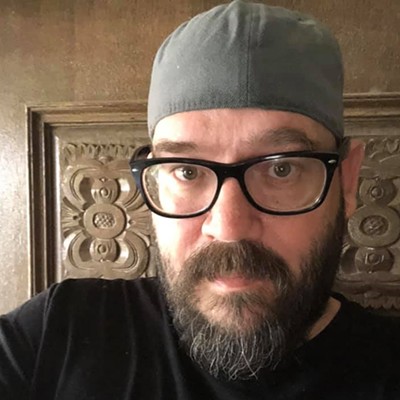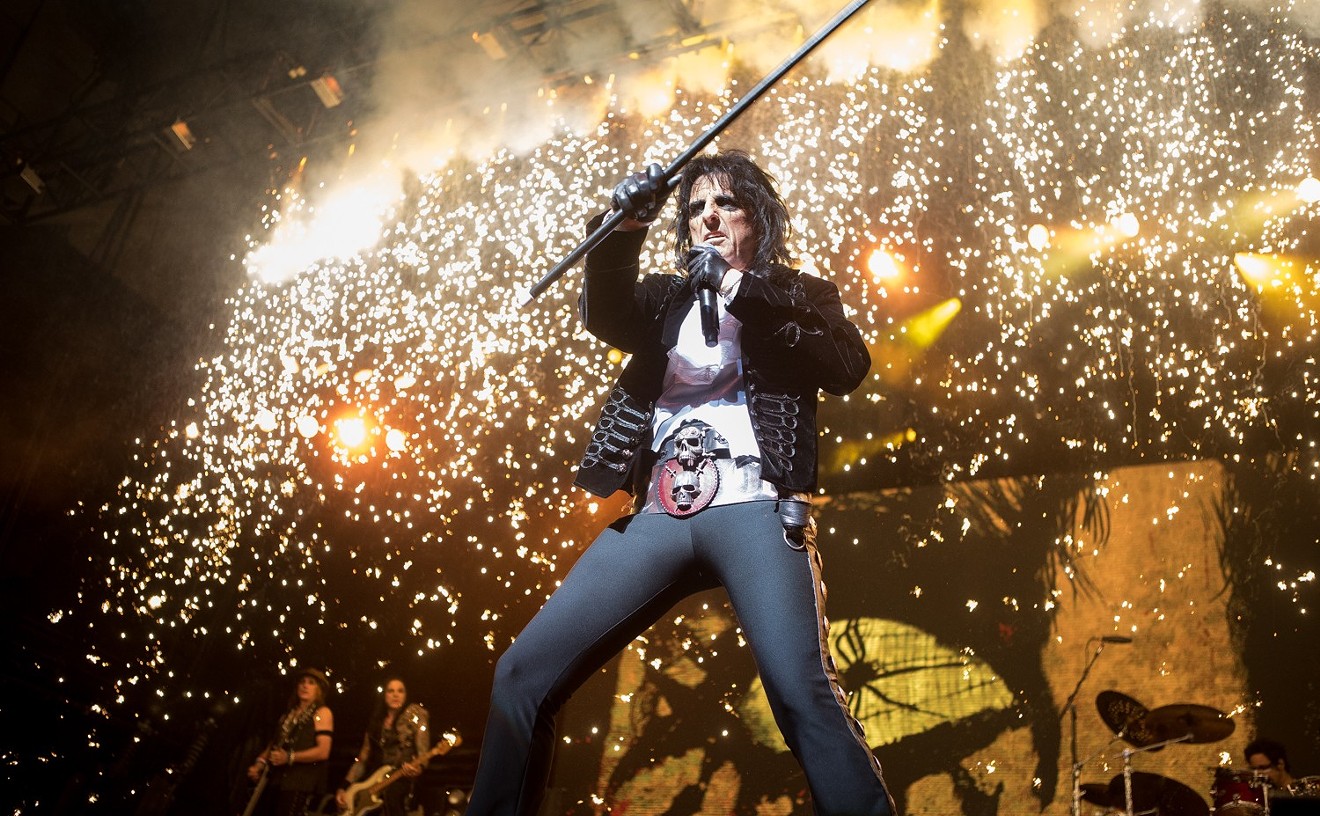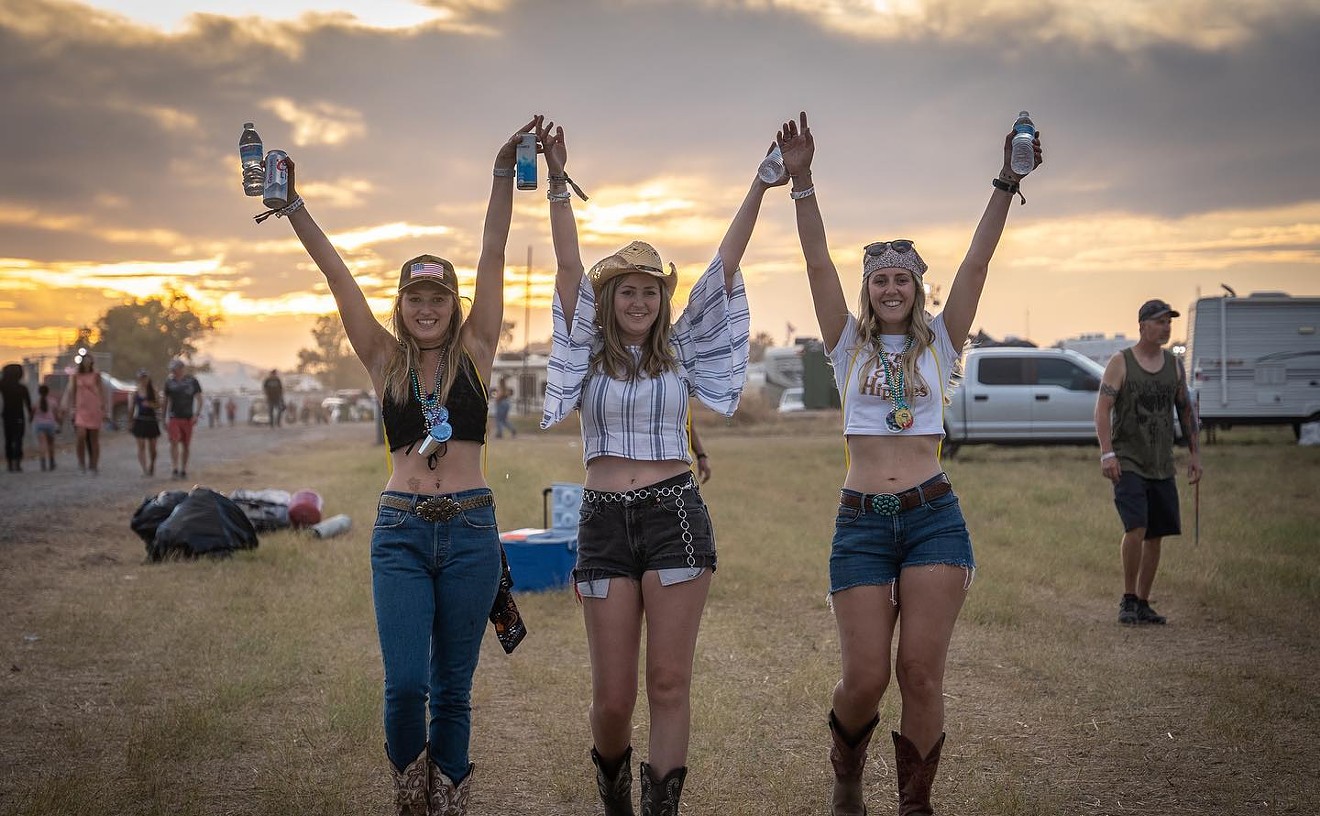It's a chilly night in early November, but the crowd of kids gathered outside 910 Live in Tempe is feeling plenty warm. It isn't surprising, given that they've spent most of the past hour skanking up a storm to the beats of local ska septet 2 Tone Lizard Kings.
Bathed in a blue and purple glow of stage lighting, the throng of barely legal music fans (a few of which sport porkpie hats and Madness shirts) danced around — elbows thrusting, knees in the air, and feet strutting — in a large circle as the band bounced its way through energetic songs like "Wayo" and "Bail Song."
Afterward, lead singer Adam Rankin, who's rocking a dapper suit, just like Jerry Dammers and the rest of The Specials did in the '80s, surveys the lively crowd of non-drinkers and asks a question.
"Did someone say the ska scene in Arizona isn't so hot?" he says, referencing a widely held misconception that local bands practicing the jumpy, Jamaican-born genre are nonexistent.
"Shut the fuck up!" replies bandmate Gary Bolena.
Though he's only joking, the bassist's expletive-laced jape is justified, considering there are currently as many active ska bands in our fair state (many of whom play at 2TLK's shows) — if not more — than during the genre's last heyday, in the late '90s. Even during those days, when No Doubt and Reel Big Fish were a staple of MTV and ska blasted across the airwaves of defunct station KUKQ, Arizona's scene amounted to roughly three groups (all of which have long since bit the dust): Phoenix's Kongo Shock, Dave's Big Deluxe from Tucson, and Flagstaff's Warsaw.
Speaking of history, the Lizard Kings' choice of venue for their CD release show is somewhat significant. In another lifetime (read: from 1991-2001), 910 Live was known as Boston's, an epicenter for ska shows in the Valley. The aforementioned local acts performed at the club regularly, as did two-tone tastemakers like The Specials and such ska-punk superstars as Skankin' Pickle and Fishbone.
Although Rankin's stage presence is nowhere near as manic as Angelo Moore's during a 1998 gig at the old Boston's (where he literally climbed the walls of the club), the Lizard Kings' singer packs as much power into his performance as the Fishbone frontman. Still, 2TLK saxophonist Dave Siebler says that an off-the-hook atmosphere is inherent to the band and its shows.
"That what's this music is all about. We get off on it when people are getting down, the band is riffing, people are dancing, and everyone is having a good time," Siebler says. "This band is at its best in a live setting with a really raucous crowd."
Ska has instigated both dancing and revelry among the younger masses since its Caribbean origins in the late '50s, when artists like Prince Buster and Clement "Coxsone" Dodd recorded a mix of R&B, calypso, and traditional Jamaican folk. Its frenetic and colorful up-tempo stylings eventually begat reggae and were a hit in dancehalls of the 1960s, when rude boys (impoverished and unemployed street kids clad in black suits) were hired by promoters to disrupt competing shows. Both the genre and its fashion was eventually transplanted to the U.K. for the two-tone revival of the '80s and, later, to America for the third wave and ska-punk revival of two decades ago.
Bolena says ska's energy and danciness are what keep it alive, if only as a niche genre.
"Today, it's still a lot like it was then — people just want to dance and have a good time. Just like people like reggae, jazz, or Motown, there will always be people who dig it. It's been popular twice before in the past and, hopefully, it will be again in the future," he says. "It just gets you up and makes you dance. I've never really seen anyone who's gone to one of our shows and not had fun."
The atmosphere of the Lizard King's gigs is what encouraged 22-year-old guitarist Matt Ventre to join the band earlier this year.
"I was watching them as a fan long before I thought I was ever gonna be in the band," he says. "And it's been just as fun being in the band as it is being in the crowd." (Disclosure: Matt is the brother of New Times contributor Sarah Ventre.)
His joining the ensemble is the latest in a long series of lineup changes that 2TLK have endured. Over the past five years, Siebler and Bolena have seen more than a dozen musicians come and go, which they attribute to a tricky learning curve for ska. It's made for some frustrating recording sessions and is one of the reasons they feel the local scene remains relatively small.
"There's a certain nuance with playing ska, and you spend time picking it up, as Matt will tell you," Bolena says. "That's the thing about a ska band: There's this feeling that everyone can do it; then you realize how much work it is."
Traditional ska style involves a 4/4 time signature and quick, upbeat rhythms, with guitar riffs and chops on the off beats.
"It can be a complete mindfuck and has a lot to do with the different of the guitar and the drummer, which make it almost feel like he's playing backwards," he says. "It's not your standard groove that you pick up in your bedroom as a teenager."
While learning ska was slightly easier for Bolena, having spent his adolescence in Florida listening to "tons of reggae," not everyone was weaned on Madness, The Selecter, and The English Beat. Bolena's spent the whole of 2TLK's lifespan teaching his bandmates the finer points of ska. He met Siebler in 2004after moving to the Valley a few years earlier and loaned the saxophonist a few of his CDs in order to get their nascent ska project off the ground.
It took 'em awhile to get things going before the band debuted as a seven-member ska cover band in 2002.
"We've gone through a lot of people trying to get a good lineup that can play ska, since most musicians shied away from it," Siebler says. "So we thought the best way was build a set of covers for everyone to learn and fill out the rest of the band. We used the cover gig to get us as far as we could and, eventually, move forward and start recording original songs."
While aping the likes of Mustard Plug and The Toasters, 2TLK built up a backlog of original material and earned a "party band" reputation and popularity among frat cats and the over-21 crowd, especially since the bulk of their gigs were at bars. They even played the local Strong Beer Festival four years in a row. ("Every year, we think there's no way they'll book us, since it gets a little too rowdy and a little out of hand, and they always call us," says Siebler.)
But despite all the fun 2TLK has at drunken gigs, they'd like to shed their "keg party with horns" label. Bolena says their sound has matured over the past five years, exemplified by their latest disc, Primeval Itch.
The catalyst behind the Lizard Kings' growth was the feedback they got after releasing their first album, 2008's Bomb's Away, which consisted of four years' worth of material. Although the band has been praised by the likes of Robert "Bucket" Hingley of The Toasters (who signed them to his Megalith Records indie label) and Skinnerbox's King Django (who mixed Primeval Itch), 2TLK also received their fair share of criticism. David Evans, editor of British fanzine SKAlphabet, particularly mentioned a certain shallowness and simplicity to the band's efforts.
"C'mon, guys, dig deep and get creative with your lyrical content, and you can help push ska music forward," Evans wrote. "No one is expecting a ska band to reinvent the wheel, but many of the tracks on [the album] are just spinning the wheels."
Bolena says it caused them to rethink some things.
"You realize, 'Oh, shit, we are like that,'" he says. "But it eventually made us a better band."
They moved away from the more third wave and ska-punk songs and got into incorporating more slower-paced rocksteady, soul ska, and other throwback aspects of ska.
Discussing what influenced Primeval Itch, Bolena drops the kind of names you'd find on a Trojan Records compilation.
"There was definitely some from first wave stuff, like Prince Buster, who is probably our big influence, Alton Ellis, and Desmond Dekker. If you listen to songs on the disc like 'Young Man' and 'Lovin' is Gone,' they are more like the rocksteady genre," he says. "It's something like what the Pietasters have tapped into in the past.
"The first album was more about the jams we had written — there really wasn't much thought behind it. Like any other adolescent entity, we came out with our first album, raging with pimples on our foreheads."
"Jerking off five times a day," Siebler adds.
"Exactly," Bolena says, without missing a beat. "And now we're more grown-up and I think our songwriting has definitely matured."
"Although I still [jerk off] five times a day," says Ventre.











